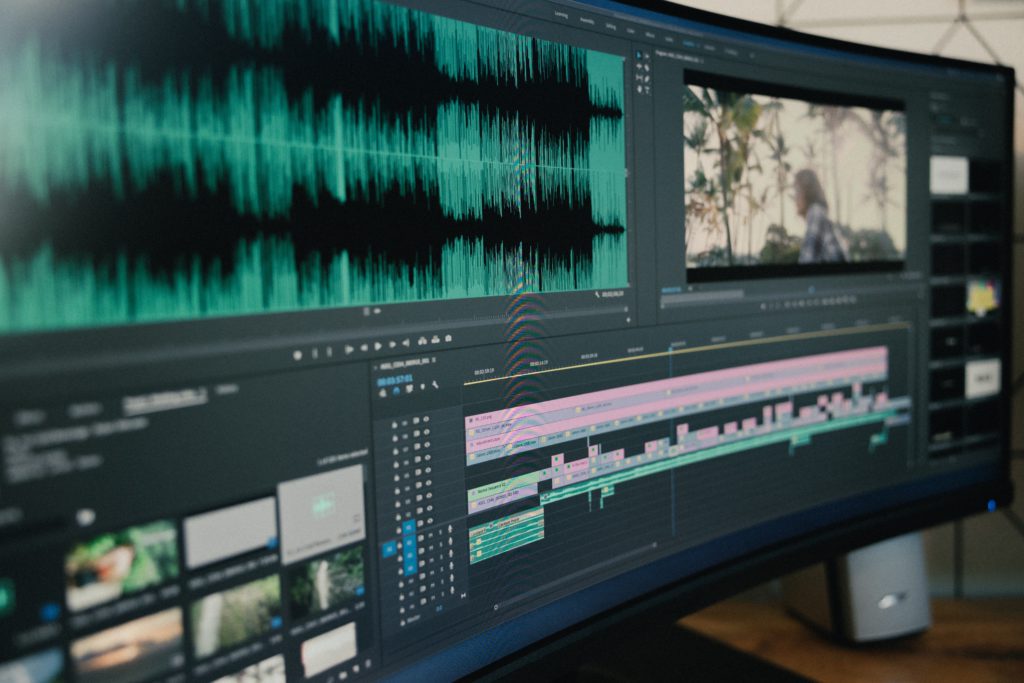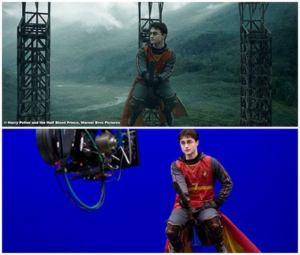A film editor is responsible for bringing a film or television show to life. Editors, like directors and screenwriters, are responsible for shaping a film’s plot, sound, and overall effects. As a result, professional editors are in high demand in the film industry.
About Film Editing
Film editing entails viewing the takes for a scene that has already been taken, cataloging them, and selecting the materials that will be included in the scene. It is an art form that entails selecting the most powerful materials (i.e., “best takes”), arranging them in a rational, expedient, and rhythmic manner, and bringing them together in a way that best fits the sense of the story being told. An editor collaborates with the director to finalize the “cuts,” and typically reports to the director for final approval of the cuts.
Learn how editors use tools when editing a movie
As a film editor, you will be responsible for archiving and storing all images, footage, graphics, and audio. Final videos are encoded to the desired size and format by editors as per the requirement from producers or clients. An editor also knows how to use Adobe Creative Suite and development tools, including After Effects and Final Cut, as well as other editing programs.
How much do film editors make?
A film editor is in charge of audio mixing and mastering. Entry-level film and video editors can expect to receive between $31940 and $43230 a year, or $15 to $21 per hour, with little to no experience. This base salary will rise as their experience grows, just like every other profession.
The average salary for film editors with average experience is $86830 per year and $42 per hour.
The wage is determined by the state in which you work; some states pay more than others because the demand for film editors is higher; for example, in California, you can receive the highest pay rate for film editors because the film industry is far greater here than in other states.
Although many factors go into determining how much money you can expect to make as a film editor, there is some excellent data on average salaries for video editors by the state in the United States, broken down by seniority rank. Although your city’s pay can vary marginally from the state average, these averages may give you an idea of what to expect.
Here’s a short rundown of the top ten states in terms of pay:
- California
- New Mexico
- Texas
- New York
- Georgia
- Nebraska
- Illinois
- Indiana
- Missouri
- Connecticut
What is being a film editor like?
A film editor is in charge of cutting and arranging a director’s raw footage into a finished product. An editor’s role entails watching all the film footage shot for motion pictures or television shows, deciding which footage to use. They assemble the footage into a finished feature film, television episode, or another piece of work using video-editing software. This method always entails reviewing and logging the video, arranging it by scenes and takes, and then forming the narrative with the director.

When cutting a project, editors usually work with a director for eight to ten hours per day. They assist in the creation of the story before it is submitted to a Colorist or Post-Sound Team. The actual editing process entails spending time with the footage shot during principal photography and determining the plot. In the editing room, a film is often remade. Storylines will be rearranged, and shots from one setup will be used in a different section of the story.
The editor provides a fresh set of eyes capable of fine-tuning a film’s cinematic grammar. They use character and perspective in storytelling to give each shot a new sense. To complete this task, all the footage must be organized and watched on a regular basis.
Important skills a film editor requires
Working as a film editor is not for you if you dislike long hours, rushed jobs, or working alone. If you can’t work well with others, want personal creative recognition, or aren’t able to keep up with emerging technology, you’ll be happier working somewhere else.
On the other hand, if you enjoy detailed work and being a part of major film production, film editing might be your ideal profession. Here are some skills you’ll need if you want to become a well-known feature film editor:
Soft and industry skills
- “Larger picture” thinking: A film editor’s job description entails more than just putting shots in the right order. They must examine all the footage to determine how to best achieve a film’s desired emotional and thematic effect. That means making decisions on a macro and micro level all the time.
- Problem-solving: Video editors are in the business of solving problems regularly. When an actor’s performance isn’t up to par, the writer has to cut around it. When the main storyline isn’t moving forward, it’s up to the editor to come up with imaginative ideas. Editors must be able to recognize issues and have solutions.
- Being meticulous: Editors must examine every frame taken by the videographer. Hundreds, if not thousands, of hours of footage may need to be checked. Editors must then whittle down this video to a reasonable length and make split-second decisions on how to cut between shots. To put it another way, editors need to be obsessive about the small stuff.
- Effective communication: Since editors are in charge of translating the director’s vision into a finished product, they must be able to interact effectively (or at the very least a rough cut). That means editors must be able to communicate with their director and share their enthusiasm for creative decisions.
- Understanding of the film industry and how movies are made, willingness to learn new things regarding the industry every day
- The movie industry and development knowledge
- It is necessary to have a keen photographic eye for camera angles and special effects, as well as a working knowledge of audio effects.
- Ability to function independently on comprehensive and sometimes boring tasks
- Working with directors, cinematographers, sound editors, special effects editors, and music producers requires strong interpersonal skills.
- Flexibility to cope with unforeseen challenges, development delays, and different personality styles.
- In high-stress or crises, the ability to stay calm and optimistic.
- Willingness to work long hours on time-sensitive projects
- A dedication to producing high-quality work whilst continuing to develop your abilities and expertise
- A personal code of ethics and a commitment to fulfilling the director’s vision rather than modifying material to create a personal artistic statement
Technology skills
When applying for work, having experience in cutting-edge technology will set you apart from the competition. You’ll also need a basic understanding of computers and the ability to work with digital equipment. You may need to know how to use,
- Adobe products like After Effects, Illustrator, and Photoshop
- AJAX
- Apple Final Cut Pro
- Avid
- HyperText Markup Language (HTML)
Work experience
To be effective in editing, you must be determined. You must demonstrate a willingness to participate and complete even simple tasks. Work experience in other areas of media production allows you to show your commitment, and it can help you determine whether the speed and precision required for an editing job are right for you. Employers will look for previous experience and evidence of working in film or video production or post-production when you apply for jobs. They’d rather see a current, well-prepared showreel.
Education requirements
Since work is often dependent on experience and industry contacts, educational criteria for film editors differ. A bachelor’s degree in film and television, film studies, or communications is common for film editors. Film editors can also major in cinematography because they need to know how to operate camera equipment. Private film schools, photographic institutes, community colleges, technical schools, and conventional universities are all options for film editors.
Curriculum
Students learn about filmmaking equipment and the filmmaking process in both programs. Traditional editing techniques such as cutting and splicing are included, but most films are now edited digitally. Final Cut Pro and Avid are the most commonly used computer editing applications for professionals. Editors may be able to learn one of these systems, but knowing both is beneficial.
Internships
Internships enable students to learn skills outside the classroom from a skilled editor or team of editors, such as editing techniques unique to a film or television genre. Internships also provide students with contacts in the industry that can help them find potential jobs. According to the United States Bureau of Labor Statistics, it’s critical to begin your career as soon as possible because editors with the most experience have the most job opportunities.
Apprenticeships
It’s uncommon for an editor to be the lead editor on a film straight out of school or even during their first few years of employment. Most film editors begin their careers as apprentice editors or editing room assistants. Apprenticeship is critical because it allows people to see how the editing process works and is a paying job, unlike an internship.
Apprentices should pay close attention to editing methods and procedures and learn how to work as an assistant editor, which is the next step in the career ladder.
The more experience aspiring film editors can get, the better off they’ll be when they start working. Pre-career learning approaches such as internships and apprenticeships should be considered. A film editor with the right experience will work their way up to becoming a lead editor.
Fitness requirements
You’ll need regular color vision to work as an editor, as you must color correct raw video.
Development of professional skills
While you’re working, you can learn on the job to help you improve specific editing skills. When studying seasoned practitioners, you’ll want to play with your work. This mixture will aid in the development of both artistic and technological abilities. To place yourself for success, you should expand your knowledge of related topics. The following are some topics covered:
- Financing for independent contractors (freelancers)
- How to make use of software editing programs
- Audio post-production
- Virtual effects
You’ll also want to make sure your knowledge of modern technologies and equipment is up to date. You should also learn more about camera or sound jobs to expand your job opportunities. This will also assist you in building a network of contacts.
Working on smaller productions leads to larger and/or more prestigious projects for freelancers. As a freelancer, it’s critical to establish a reputation while honing your networking skills. It’s important to have good working relationships with everyone, from production managers to distributors to freelance directors. These individuals will often bring their favorite editors along on new projects.
Pointers to consider if you want to work as a film editor
Being an editor requires you to know and experience a lot of things. Here are some pointers to remember if film editing is a career you wish to pursue.
- Go to the cinema
Aspiring video editors should spend as much time as possible watching movies, television shows, music videos, and short films. Pay attention to the film’s rhythm, pacing, and editing techniques.
What is the duration of each scene? How easily does the editor move from one shot to the next? What sound effects or visual prompts add suspense, drama, or levity to a scene? You can create your film editing style and technique by paying close attention to an editor’s work in a film.
- Attend a film school
Enrolling in a film school like Nashville Film Institute, university, or community college that offers degree programs in film production is one of the best ways to start your career journey as an editor. A bachelor’s degree in film and video production will give you access to film editing courses as well as the software that is commonly used to edit film and video footage (such as Final Cut Pro and Adobe Premiere).
In addition to visual effects, cinematography, screenwriting, and general film theory, a film school’s coursework will typically include instruction in other aspects of film production and the post-production process, both of which are important in giving film and video editors a well-rounded understanding of visual storytelling.
- Work in entry-level positions
While editing jobs are scarce, working as a production assistant on a film set or in a low-level position at a Hollywood production company may provide valuable experience. These positions will allow you to work alongside directors, cinematographers, camera operators, and assistant editors, which will help you break into the filmmaking industry.
Though this form of work often entails long hours and low pay, it can also help you gain experience in the film industry and build a network of contacts that can help you find editing work in the future.
- Make a resume
In the past, aspiring editors needed to have access to bulky, costly editing equipment to create reel-worthy work. However, with the advent of digital media and consumer video editing applications, the editing process has never been simpler or more accessible. Produce and edit your work if you can’t find video editing jobs.
Offer to edit your friends’ work. Also, low-paying editing jobs can help you hone your editing and computer skills. Doing so allows you to experiment in areas where you might lack expertise, such as special effects and provide job experience that you can apply to skilled work. In any case, you’ll have plenty to add to your reel to entice a potential employer, and you’ll be well on your way to joining the editors’ guild!
Employment prospects, including employer
In general, employment in this sector is increasing. Editors will have more job opportunities as internet-only outlets such as streaming services rise in popularity. Film and video editors are employed in the following fields:
- Animation
Film editors in animation editors will have the same job as that of a feature film, except they will be dealing with modeled characters instead of actors.
- After-production
The work that is performed on a film or video after it has been shot or recorded. Last but not least, there’s post-production. The arranging, cutting, painting, and editing of the video recorded during production is known as post-production.
- Broadcast
A broadcast or service on the radio or television. The simultaneous delivery of the same message to several recipients is known as broadcasting. When a transmitted data packet is received by all network equipment, this is known as broadcasting.
You may also be able to find work with independent production companies. Larger independent firms, as well as some post-production houses, hire a few editors on long-term contracts.
Film and television studios also have their editors. However, most businesses use freelance editors daily, and some businesses only use freelance editors. Freelancing can aid in the development of a portfolio. All jobs in this area, including entry-level positions like a runner, are subject to fierce competition.
Finding consistent work requires networking and getting to know people in the industry, as well as building good working relationships. You can even advertise once you’ve gained some freelance experience.
Promotion in the broadcasting or post-production industry
Building a portfolio and networking are two important aspects of film and video editing performance. Typically, you will begin your career as a trainee or runner. From there, you can advance to the rank of assistant editor.
If you work for a larger business, you will advance from runner to digitizer, assistant editor, and finally senior editor. In terms of a career path, larger corporations have more structure. In a large corporation, an accomplished in-house film and video editor can advance to management.
Editors usually start as assistant editors and work their way up to becoming trained editors after three or four years. Whatever your long-term objectives, you must be able to start from the ground up and take a constructive approach. Since this environment is always evolving, your ability to adapt is essential to furthering your career. If you’re willing to move, you could improve your chances of landing a job early in your career.
Famous film editors of the industry
The film industry is blessed with gem-like editors, and here are some of them.
- Dede Allen
Dede Allen began her career at Columbia Pictures as a messenger. She progressed through the ranks to become a sound cutter and assistant editor. Her first work as a film editor was for director Robert Wise, and she has since established herself as one of America’s most fashionable and imaginative editors.
- Thelma Schoonmaker
Thelma Schoonmaker is an editor who has worked on films such as The Departed (2006), Raging Bull (1980), and The Irishman (2019). Michael Powell was her previous husband.
- Michael Kahn
Michael Kahn is an editor who has worked on films such as Saving Private Ryan (1998), Jurassic Park (1993), and Minority Report (2002).
- Arthur Schmidt
Arthur Schmidt is an acclaimed editor who has worked on movies including Forrest Gump (1994), Pirates of the Caribbean: The Curse of the Black Pearl (2003), and Back to the future (1985).
Film editor facts
Finally, any aspiring film editor should know some quick and fun facts about film editing before setting off on this path. Some of them are given below.
- The Motion Picture Editors Guild, headquartered in the United States, has over 6,000 active and inactive film editors (these include sound editors and story editors as well).
- The majority of film editing work is done in Los Angeles (where the Hollywood studios are) and New York City.
- Several film editors are working on independently funded features all over the world.
- The first-ever Oscar for film editing was given to Conrad A Nervig for his work in the movie ‘Eskimo.’
- The first-ever non-linear computerized machine was released in 1971 and received the Emmy award for its contribution to the film industry.
- No Country for Old Man was the first movie edited by Apple’s Final Cut Pro to win an Oscar.
Being a film editor is difficult, but when you enjoy what you’re doing, and it’s your passion to bring images/videos to life with a story or the creativity of a producer/director, the long hours and back pain are well worth it.












